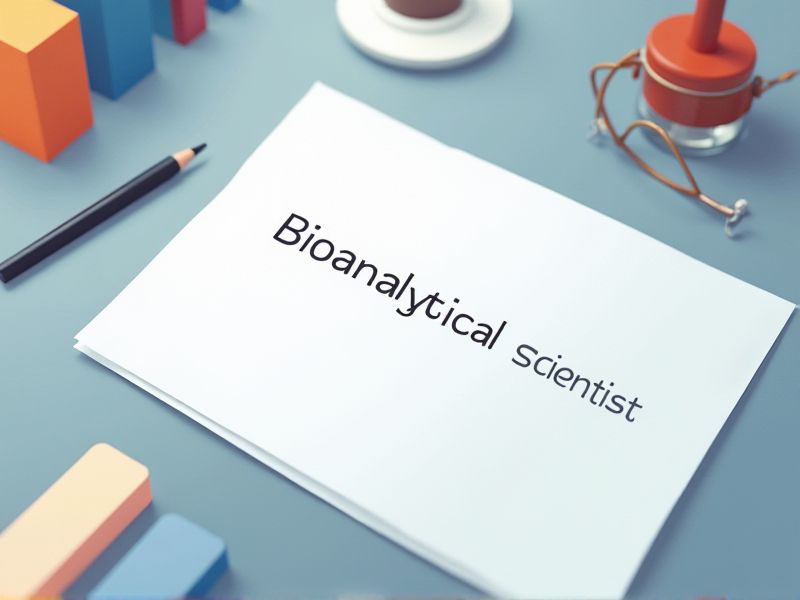
Bioanalytical Scientists engage in precise chemical analysis and contribute to drug development, requiring strict adherence to industry standards. Certifications ensure these scientists possess the necessary skills to perform complex procedures and maintain data integrity. Regulatory bodies demand these qualifications to guarantee compliance with safety and quality parameters. Below are some essential certifications for a Bioanalytical Scientist.
Certified Bioanalytical Scientist
A Certified Bioanalytical Scientist is needed for credibility in analytical processes, as their certification validates expertise and accuracy. Certification ensures adherence to industry standards, enhancing data integrity and reliability. A certified professional demonstrates a commitment to ongoing education, staying updated with the latest advancements. This qualification often leads to improved lab practices and optimized outcomes in research projects.
Certified Clinical Research Professional (CCRP)
The CCRP certification ensures that a Bioanalytical Scientist possesses a thorough understanding of clinical research protocols, which is essential for maintaining the integrity and validity of study results. Without this certification, there's a higher risk of non-compliance with regulatory standards, potentially leading to operational inefficiencies and compromised data quality. A CCRP-certified professional is more likely to implement effective data management practices, improving the reproducibility and reliability of bioanalytical findings. Certification also demonstrates a commitment to ongoing professional development, which can enhance credibility with stakeholders and foster trust in research outcomes.
Good Laboratory Practices (GLP) Certification
Good Laboratory Practices (GLP) Certification ensures that bioanalytical scientists adhere to standardized procedures, leading to consistent and reproducible results. When laboratories comply with GLP, regulatory authorities can trust the data submitted, enhancing the integrity of scientific studies. GLP certification minimizes errors and reduces risks of contamination, directly supporting more accurate and reliable outcomes. In a competitive research landscape, GLP adherence enhances a laboratory's credibility, fostering trust among stakeholders and clients.
Good Clinical Laboratory Practices (GCLP) Certification
GCLP certification ensures that bioanalytical scientists adhere to standardized methods, improving data accuracy and reliability in clinical trials. With standardized protocols, scientists minimize errors in laboratory processes, leading to more consistent and verifiable results. Certification reinforces compliance with regulatory guidelines, enhancing credibility and trust with stakeholders. This trust accelerates the drug development process, as regulatory agencies are more likely to approve data from certified professionals.
American Board of Clinical Chemistry (ABCC) Certification
Obtaining ABCC Certification demonstrates that a bioanalytical scientist meets the rigorous standards of expertise and proficiency in clinical chemistry. This credential is often necessary for career advancement, as it validates the individual's knowledge and skills to employers and peers. The certification can enhance a scientist's capability to produce reliable and precise biochemical data critical for patient care and medical research. ABCC Certification may be required or preferred by certain employers and regulatory bodies, impacting job opportunities and compliance with industry standards.
Certified Quality Auditor (CQA)
A Certified Quality Auditor (CQA) is needed for a Bioanalytical Scientist because it ensures compliance with industry standards, which is crucial for maintaining the integrity of laboratory results. CQA certification enhances a scientist's capabilities to conduct systematic audits, which aid in identifying potential issues in bioanalytical processes. This qualification supports consistent quality improvements and fosters a culture of accountability and precision in research settings. Bioanalytical scientists with CQA expertise are better equipped to ensure data accuracy, leading to more reliable scientific outcomes.
Certified Quality Engineer (CQE)
A Certified Quality Engineer (CQE) enhances a bioanalytical scientist's ability to uphold rigorous quality standards in laboratory processes, ensuring accurate and reliable results. The CQE training equips scientists with skills in process improvement and risk management, essential for maintaining compliance with industry regulations. Expertise in quality engineering aids in identifying and mitigating errors in experimental workflows, crucial for data integrity. Knowledge gained from CQE certification fosters a culture of continuous improvement, benefiting both research outcomes and organizational efficiency.
Six Sigma Green Belt Certification
Six Sigma Green Belt Certification equips bioanalytical scientists with process improvement techniques that enhance laboratory efficiency and data accuracy. Enhanced problem-solving skills enable scientists to effectively identify and eliminate bottlenecks in experimental workflows. The certification provides a structured approach to quality control, reducing variability and ensuring consistent, reliable results. This alignment with best practices in data analysis and quality assurance heightens the scientist's capability in contributing to innovative and compliant laboratory settings.
ISO 17025 Accreditation Training Certificate
ISO 17025 Accreditation Training equips bioanalytical scientists with a thorough understanding of quality management and competency in laboratory testing. This training ensures that their lab results meet international standards, fostering trust and reliability in their analyses. When scientists hold this certification, laboratories can streamline workflows, reduce errors, and maintain consistent performance. Laboratories with ISO 17025-accredited staff demonstrate a commitment to continuous improvement, which can enhance competitiveness in the bioanalytical field.
Certificate in Bioanalytical Method Development
Bioanalytical Method Development certification enhances a bioanalytical scientist's proficiency in developing precise and reliable analytical methods essential for drug development. This certification ensures adherence to regulatory standards, which is crucial for the accuracy and reproducibility of bioanalytical data. Enhanced skill set through certification translates to increased efficiency in identifying and analyzing biological markers. Competency in this area elevates a scientist's contribution to research teams, increasing the overall quality and speed of analytical projects.
Summary
Gaining certifications as a Bioanalytical Scientist can enhance your credibility and open doors to advanced career opportunities. You'll likely experience increased employability as employers often favor candidates with recognized qualifications. Certifications can also broaden your skill set, enabling you to handle more complex analytical tasks and projects. This expertise may lead to higher salary prospects and job security within the competitive field of bioanalytics.
